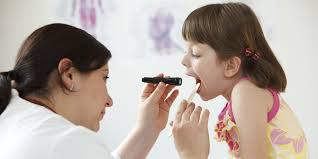Doctors' offices can be scary places for kids (and for the adults who love them). At Iowa Radiology, we are committed to helping your child feel safe and comfortable, and helping you understand the benefits and risks of each procedure we perform.
What kind of specialists will be helping my child?
A pediatric radiologist is a medical doctor who, after his or her additional four years of specialized radiology residency, completes a further one to two years of training specializing in child-specific issues and safety. A pediatric radiologist is specifically trained to recognize and diagnose various diseases in children and young adults up to 18 years old, using the latest and safest methods of medical imaging. Here at Iowa Radiology,a trained pediatric radiologist and our skilled team of technologists will provide your child care specifically tailored to his or her medical needs and developmental stage.

Is my child at greater risk because of radiation exposure?
While there is evidence that exposure to radiation levels found during CT scans may slightly increase the risk of future cancer in both children and adults, children’s bodies may be more sensitive to radiation and susceptible to its effects. On average, for every 1000 children, 200 will eventually develop cancer regardless of exposure to medical radiation (an ordinary risk of 1 in 5). For those same 1000 children, one cancer will likely result from undergoing a single CT scan of the abdomen (risk of 1 in 1,000).[1] This additional risk is very small and should be balanced against the benefit that the scan is intended to have in treating or diagnosing illness or injury. CT is a very powerful and valuable imaging technique that can provide important and even life-saving information. The FDA advises that “in children and adults, the risk from a medically necessary imaging exam is quite small when compared to the benefit of accurate diagnosis or intervention” and recommends limiting scans to the most targeted and specific areas possible to minimize radiation dose.[2]
Sometimes, however, imaging tests like ultrasound and magnetic resonance imaging (MRI) can provide the same information as a CT scan is intended to provide without exposing your child to any radiation. You should ask your doctor and imaging provider whether these alternatives are appropriate for your child’s situation.
How can I reduce the risk of radiation exposure for my child?
If a CT is the best test, then Iowa Radiology will use appropriate low dose techniques to minimize radiation exposure during the test. In all cases, we follow the principle of “ALARA” (“as low as reasonably achievable”) in terms of radiation dose. If it is possible to obtain the desired clinical information using ultrasound or MRI, which deliver no radiation dose, we will recommend it.
The best way to lower the risks to children from radiological studies is a team approach involving education and up-to-date training in best practices and the use of the most current technology. The radiologist will ensure that every imaging study in pediatric patients is thoughtful, appropriate, and medically indicated for that child, while the technologist ensures that protocols are adjusted to use child-size parameters and verifies that proper scan technique factors are set for each pediatric scan (accounting for the size and development of your child, the relevant body part, and the reason for imaging).[3] Specific pediatric protocols minimize radiation dose for children. We are leaders in the acquisition of the most up-to-date dose radiation reduction technology, called SAFIRE. This new generation of image reconstruction technology has been shown to reduce the radiation dose to our patients by up to 60% and improve image quality. Because a lower dose directly translates to lower risk, the use of SAFIRE technology ensures safer imaging for our patients. Extensive personnel training and the use of low-dose methods were necessary steps to receiving American College of Radiology (ACR) accreditation for our CT scanners.
If you have any questions or concerns about pediatric radiography, we are happy to help and to make both you and your child more comfortable. We would love to talk with you – give us a call.
The information contained in the Iowa Radiology website is presented as public service information only. It is not intended to be nor is it a substitute for professional medical advice. You should always seek the advice of your physician or other qualified healthcare provider if you think you may have a medical problem before starting any new treatment, or if you have any questions regarding your medical condition.Iowa Radiology occasionally supplies links to other web sites as a service to its readers and is not in any way responsible for information provided by other organizations.
[1] http://www.imagegently.org/Portals/6/CT%20Parents%20Content.pdf
[2] “Computed Tomography (CT).” U.S. Food & Drug Administration (FDA. U.S. Department of Health and Human Services. Web. 22 Oct. 2014.
[3] http://www.jacr.org/article/S1546-1440%2813%2900664-9/fulltext#sec5


